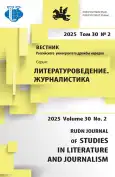«Сага о Констанции» в первой половине XIV в.: сюжетно-жанровые трансформации
- Авторы: Семёнов В.Б.1
-
Учреждения:
- Московский государственный университет имени М.В. Ломоносова
- Выпуск: Том 30, № 2 (2025)
- Страницы: 271-280
- Раздел: Литературоведение
- URL: https://journal-vniispk.ru/2312-9220/article/view/319126
- DOI: https://doi.org/10.22363/2312-9220-2025-30-2-271-280
- EDN: https://elibrary.ru/IUWSPW
- ID: 319126
Цитировать
Аннотация
Рассматривается вопрос об эволюции сюжета, возникшего и развивавшегося в западноевропейских литературах XIII в., позднее названного «Сагой о Констанции». Единая сюжетная формула историй, воплощающих этот сюжет и составляющих общность на основе мотива «обвиненной королевы», «оклеветанной жены», пока не была представлена в исследованиях. Тенденции фабульного генезиса этой «Саги» также не были выявлены. В статье автор исходит из того, что формула общности для подобных историй состоит из двух основополагающих ситуаций: 1) «расставание с семьей», включающее мотивы брака, беременности, долгого удаления мужа от жены по делам, подмены писем супругов, несправедливого обвинения жены, ее наказания изгнанием; 2) «воссоединение» - узнавание и встреча спустя долгое время. Каждую из этих ситуаций предваряет ее мотивировочный комплекс. Задача исследования - проследить, насколько оказались фиксированы элементы мотивировочных комплексов, появлялись ли среди них новые свободные мотивы, были ли они связаны с выбором жанровой формы для конкретного текста, воплотившего этот сюжет с его четырехчастной формулой. Материалом послужили сочинения первой половины XIV в.: «История графини Анжуйской» Жана Майара, история о Маргарите из «Небесной лестницы» Жана Гоби-младшего, анонимная «История о дочери венгерского короля» и история о Констанции из «Хроник» Николаса Тревета. Основные выводы: в первых трех историях мелкие вводимые мотивы не нарушили устоявшейся формулы и в то же время оказались связанными с новой жанровой формой, а в сочинении Тревета обнаружены революционные преобразования, которые не нарушили двух сюжетослагающих событий, но переопределили начальный мотивировочный комплекс, устранив из традиционной истории тему инцеста, и в то же время продемонстрировали мультижанровый характер истории.
Ключевые слова
Об авторах
Вадим Борисович Семёнов
Московский государственный университет имени М.В. Ломоносова
Автор, ответственный за переписку.
Email: vadsemionov@mail.ru
ORCID iD: 0000-0003-2532-5381
SPIN-код: 8165-1918
кандидат филологических наук, доцент кафедры теории литературы
Российская Федерация, 119234, Москва, Ленинские горы, д. 1, стр. 51Список литературы
- Bäckström, P.O. (1845). Svenska Folkböcker. Sagor, legender och äfventyr, efter äldre upplagor och andra källor utgifne, jemte öfversifgt af svensk folkläsning från äldre tid till närvarande tid. Bd. I. Stockholm: A. Bohlins Förlag.
- Black, N.B. (2003). Medieval Narratives of Accused Queens. Gainesville: University Press of Florida.
- Bofarull y Mascaró, P. (1857). Documentos literarios en antigua lengua catalana (siglos XIV y XV). Imprenta del Archivo.
- Gorbunov, A.N. (2010). Chaucer Medieval. Moscow: Labirint Publ. (In Russ.)
- Gough, A.B. (1902). The Constance Saga. Mayer & Müller.
- Delarue, G. (1834). Essais historiques sur les bardes, les jongleurs et les trouvères normands et anglo-normands. T.I. Caen: Mancel.
- Mikhaylov, A.D. (1976). French chivalric romance and issues of genre typology in medieval literature. Moscow: Nauka Publ. (In Russ.)
- Polo de Beaulieu, M.A. (2015). Dialogus miraculorum: The Initial Source of Inspiration for Johannes Gobi the Younger’s Scala coeli? In V. Smirnov, M.A. Polo de Beaulieu, & J. Berlioz (Eds.), The art of Cistercian persuasion in the Middle Ages and beyond: Caesarius of Heisterbach’s Dialogue on miracles and its reception (pp. 183–210). Leiden: Brill.
- Prades, G.P. (Ed.). (2021) La Filla Del Rei D’hongria: Tres Contes Truculents De L’edat Mitjana. Editorial Barcino.
- Semyonov, V.B. (2023). The Constance Saga: On parallels from Medieval European Literatures of the 13th century to the Plot of The Tale of Tsar Saltan by A.S. Pushkin. Scientific notes of Orel State University, (4), 186–193. (In Russ.)
- Schlauch, M. (1927). Chaucer’s Constance and Accused Queens. New York University Press.
- Thompson, S. (1946). The Folktale. The Dryden Press.
Дополнительные файлы









